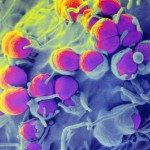Lien vers Pubmed [PMID] – 17433228
Med Sci (Paris) 2007 Apr;23(4):386-90
Despite important success of preventive vaccination in eradication of smallpox and in reduction in incidence of poliomyelitis and measles, infectious diseases remain the principal cause of mortality in the world. Technologies used in the development of vaccines used so far, mostly based on empirical approaches, are limited and insufficient to fight diseases like malaria, acquired immunodeficiency syndrome (AIDS) or adult tuberculosis. Until recently, technologies for making vaccines were based on live attenuated microorganisms, whole killed microorganisms and subunit vaccines such as purified toxoids. Fortunately, the recent advances in the understanding of host-pathogen interaction as well as our increasing knowledge of how immune responses are triggered and regulated have opened almost unlimited possibilities of developing new immunization strategies based on recombinant microorganisms or recombinant polypeptides or bacterial or viral vectors, synthetic peptides, natural or synthetic polysaccharides or plasmid DNA. Thus, considering the expending number of technologies available for making vaccines, it becomes possible for the first time in the history of vaccinology to design vaccines based on a rational approach and leading to increased efficacy and safety.

